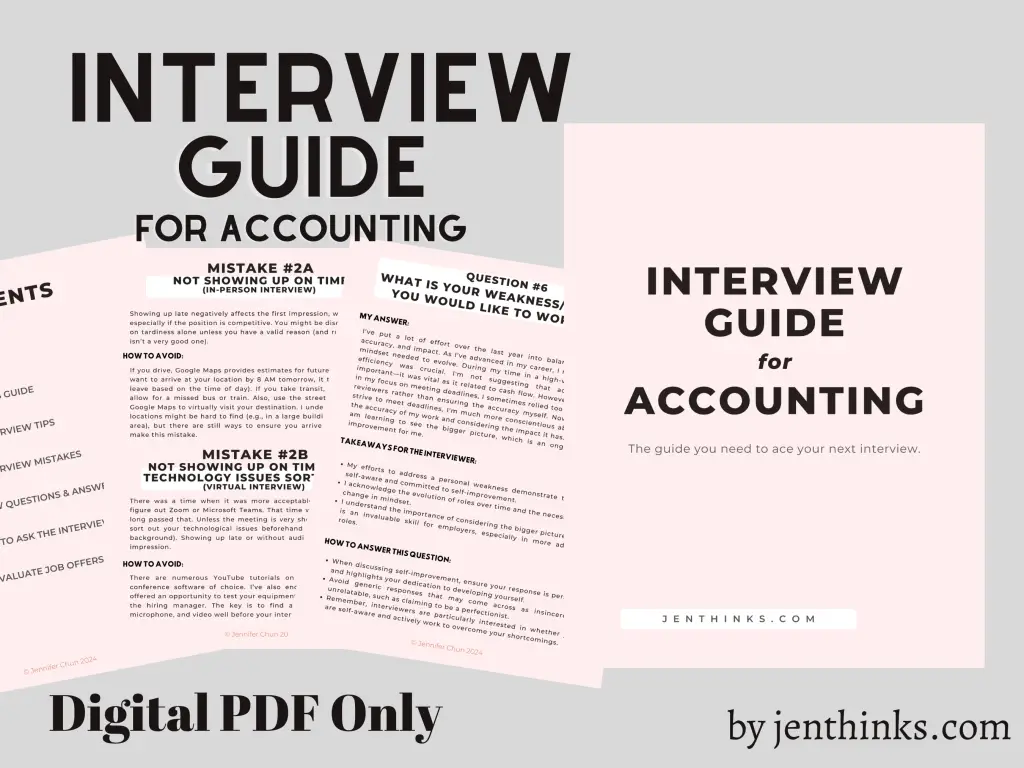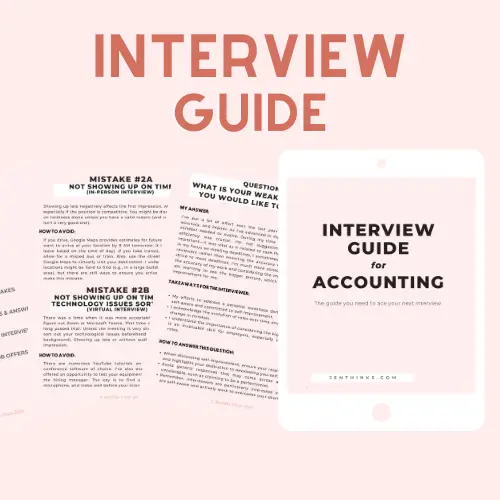It was my last day at work yesterday, and I received questions from some of you after I shared it on my Instagram story. Here are the common questions:
- Why did you leave your job?
- Why did you take a step down (from Controller > Sr Acct)? Are you not worried about your career progression?
- Where are you going?
- Are you not worried about what the new job is like? What if grass isn’t greener on the other side?
To help you understand where I am, here’s my 8-year professional journey as a CPA:
- 1 year 3 months: AR/AP > Junior Acct, heavy machinery (< 15 employees in Finance)
- 2 years 5 months: AP > AP Team Lead, tech (< 40 employees in Finance)
- 2 years 9 months: Acct > Sr Acct, tech (< 5 employees in Finance)
- 1 year 8 months: Sr Acct > Controller, tech (< 5 employees in Finance)
- Next step: Sr Acct, tech (< 50 employees in Finance)
My total compensation (base + bonus) exceeded $100K around the 6th-year mark and I was a Sr Acct then. I received my first $100K+ base offer about a year after obtaining my CPA designation. Most recently, I took a pay cut on my base salary by stepping down from being a Controller and accepting a Sr Acct role. With that being said, for the first year, I consider the negative impact on my total compensation immaterial (< $10,000) with all things considered. Also, as you read on, you’ll see that compensation was actually not a factor on my list when it came to my decision to leave. While I was being compensated at the lowest end of the market range, it was the compensation I agreed to when I accepted the promotion.
Struggling with accounting interviews? Gain the edge you need with my interview guide created for accounting. It includes 25 most common accounting interview questions and answers, interview mistakes, questions to ask, tips and more!
Why Did You Leave Your Job? Do You Not Like Being a Controller?
The short answer is: I didn’t quit because I didn’t like the people or wasn’t paid fairly. I quit because I didn’t enjoy most of the work I was doing, and it affected me mentally.
I wrote about being burned out about two months before I quit. I said “Through conversations and self-reflection, I was able to identify the root causes of why I burned out and actions I can take to tackle them.” Those words were true when I typed them, but it was also true that I simply let my natural optimism take priority. Looking back, it made sense for me to conclude that as there were changes happening that I was hopeful about. It did make things easier, but it just wasn’t enough.
I had an extended vacation scheduled weeks after I wrote that post. I thought taking some time to unwind and recharge was exactly what I needed. I went to one of our favorite cities and got to spend time with my family. I worked remotely for a couple of weeks to help the team with accounting close, but that was it.
Work continued to occupy my headspace when I was supposedly on vacation. I simply can’t turn it off, and the to-do list of work I didn’t enjoy doing put a damper on my mood repeatedly. I already had trouble sleeping through the night before my vacation started, and while it was significantly better when I was traveling (all the walking helped), I simply wasn’t relaxed.
For years, I had actually never disliked the work I had to do. Yes, there was always administrative work that I didn’t find interesting or stimulating, but those were never the bulk of my job duties. For example, filling out surveys for Statistics Canada was less than exciting, but those only happened once or twice a year. However, the satisfaction and challenge from the remainder of my work always made up for the minority of work I didn’t enjoy. Unfortunately, it was the opposite of that before I quit. I found myself left with no time to do what motivated me intrinsically after I had completed priority number one, two, and three.
The good news is, this experience has helped me reaffirm what I truly enjoy doing. I thrive on building working papers, improving processes, and mentoring. While I can definitely do all of that at my previous job, it was extremely difficult to do so unless I was willing to work long hours, as I had more time-sensitive matters to attend to before tackling the nice-to-dos on my to-do list. I barely used ChatGPT towards the end of my time, as the administrative work I had to do didn’t require or wouldn’t necessarily benefit from the assistance of the generative AI tool.
Furthermore, my mental state affected jenthinks and the people around me. I no longer had the energy or motivation to work on my blog after work. My stress also stressed my loved ones out. I was less willing to do activities as I was mentally exhausted. I simply wasn’t as fun to be with, and being fun has been a core part of my identity. Don’t get me wrong – no one forced me to be fun, but even I can’t stand the less energetic version of myself.
There were two routes I could take: I could explore my options with my previous employer, or I could go elsewhere. Neither option is superior by default, and it really depends on a lot of factors. I chose the latter this time around.
If you’re feeling the same as I did but are unsure about what to do, remember this: it’s not about making the best decision (strategically for your career, financially, or for others); it’s about making the decision your future self will be proud of. To conclude my answer, I’m proud of myself for putting my happiness first.
Why Did You Take A Step Down (From Controller > Sr Acct)? Are You Not Worried About Your Career Progression?
Someone I’m not close with actually said to me, “I’m sad you have to go back to being a Sr Acct.”
I wasn’t shocked by that statement, as it didn’t come from anyone who knew me well. It’s a common response whenever someone takes a “step down” in their career, as society conditions us to think that climbing the corporate ladder is important. I’m not arguing against its importance, but I think it’s essential to understand what makes it important to you. Is it financial? Is it prestige? Is it the only route to get what you want?
If you know me well, you’d know that both happiness and financial well-being are important to me. This is why I’ve been diversifying my income for years and why, despite my corporate salary being my biggest source of income, I’m more than happy to take a pay cut if it is beneficial to my mental health and allows me the mental capacity to grow my other sources of income, like jenthinks.
Also, I wanted to focus on what I found stimulating while taking on an informal mentorship role over a formal one. A close friend of mine, whom I used to work with, reminded me – she mentioned how I was always eager to help and teach when we worked together. I enjoyed doing that as I didn’t feel like it was an obligation. It was fulfilling as I was simply helping my peers out. It was different when I did the same as someone’s manager, as the obligation took away the internal meaning for me. I’m not saying I’ll say no to being in management forever, but I’m happy where I am for now.
So, be happy for me. I’m happier than ever because self-awareness is a gift. This was a strategic move I made on behalf of my future self, as I know the dividends of my decision will be worth not following a linear path just because.
Where Are You Going?
As I’ve mentioned in the introduction, I’ve taken a pay cut and accepted a Sr Acct offer at another tech company with a bigger finance team.
Are You Not Worried About What The New Job Is Like? What If Grass Isn’t Greener On The Other Side?
This is a common question I get whenever I talk to others about their careers. While I never set an intention to change jobs often, my average tenure has been just over two years. I’ve never pursued opportunities on a whim because I always looked with intention. I’ve quit jobs because of management, lack of growth, and most recently, job responsibilities. More often than not, I would receive offers to stay after I handed in my resignation letter. I never accepted them because I wouldn’t have quit if I was willing to stay for reasons that can be negotiated (e.g., pay, growth).
This mindset means that when I do decide to quit, the reasons to stay (there always are) aren’t enough to keep me there. So, if you follow the logic, staying isn’t an option I’d consider. What I always say is this: while you can never be sure whether the grass is even green on the other side, you can be certain about how you feel about where you are right now.
Nothing is forever. If you don’t end up liking where you go, do something about it. I mentioned you have two options: explore options where you are or go elsewhere. However, there are actually more options than that. You can consider a new career, a side hustle, taking a sabbatical, stepping down/up/sideways, etc.
We’re the owners of our journeys, so take control of that.



